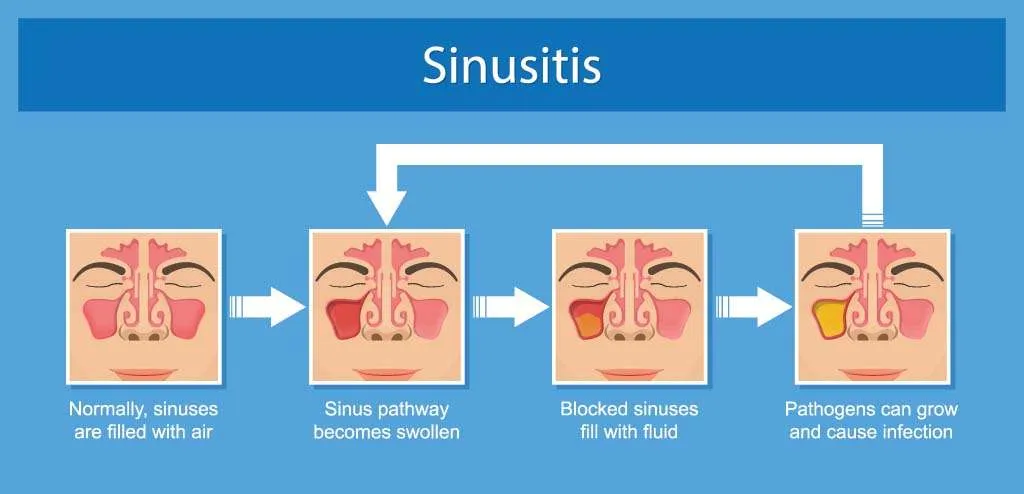Sinusitis

What is Sinusitis?
Chronic sinusitis, also referred to as chronic rhinosinusitis, occurs when the sinus linings swell, become inflamed, and prevent proper drainage typically resulting in infections and blockages. Chronic sinusitis is diagnosed typically when these symptoms occur for 3 months or longer, despite treatment protocols.
One in eight adults suffers from chronic sinusitis annually and is considered one of the most common health ailments in the United States.
If You Suffer from Chronic Sinusitis, You Know How It Feels
You experience facial pain, facial pressure, and headaches. You experience nasal congestion and feel as if you constantly have a cold. You don’t breathe well or sleep well. Even your sense of smell and taste are compromised. You may even feel depressed and more tired than usual.
Chronic sinusitis can be caused by an infection, nasal polyps, or swelling of the sinus linings.
Symptoms of Chronic Sinusitis
- Inflammation of the nasal passages
- Runny nose with thick, discolored mucus
- Postnasal drip
- Nasal congestion accompanied by breathing difficulties
- Facial pain (forehead, eyes, nose, cheeks, upper jaw and teeth, or ears)
- Compromised sense of smell and taste
- Headache
- Sore throat (sometimes accompanied by a cough or uncomfortable clearing of the throat)
- Halitosis (bad breath)
- Fatigue
Causes of Chronic Sinusitis
- Deviated nasal septum – a deviated septum can block one side of your nasal passage which can compromise airflow, create breathing difficulties, and potentially lead to snoring and sleep apnea. A CT scan or MRI can help in diagnosing structural abnormalities
- Nasal polyps – nasal polyps can block sinuses and nasal passages
- Allergies– sometimes referred to as allergic rhinitis, can result in nasal congestion, a clear runny or stuffy nose, itchy eyes and nose, sneezing, and watery eyes. You can also experience a cough from post-nasal drip in addition to loss of smell and taste
- Asthma
- Respiratory tract infections
- Weak immune system
- Other medical conditions such as HIV or cystic fibrosis
Treatments for Chronic Sinusitis
Myriad treatment options are available to chronic sinusitis doctors to treat sinusitis:
- Nasal sprays
- Nasal rinses
- Oral or injected corticosteroids (for severe symptoms)
- Allergy medications and/or immunotherapy (allergy shots to reduce allergen reactions)
- Aspirin desensitization treatment
- Antifungal treatment (only if infection is caused by fungi)
- Medications to treat nasal polyps and chronic sinusitis
- Antibiotics (if infection is caused by bacteria)
- Endoscopic Sinus Surgery – Berger Henry ENT performs endoscopic sinus surgery, a safe, gentle, and out-patient procedure, under local sedation/anesthesia. There is little discomfort and no expected bruising or swelling. No external changes are made. In addition, as a minimally-invasive procedure, in most cases no nasal packing is required. Endoscopic sinus surgery offers you safe, gentle and long-lasting relief from sinus pain and is covered by medical insurance
- Balloon Sinuplasty – Balloon sinuplasty is a safe, effective, and minimally invasive alternative to endoscopic sinus surgery that relieves chronic sinusitis by using a FDA-approved balloon to open clogged and inflamed sinuses. It’s performed in the office and does not require packing. Patients can expect to return to normal activity in 24-48 hours. Balloon sinuplasty is an insurance-covered procedure
When to Schedule an Appointment with your ENT Doctor
Acute sinusitis is a sinus infection that last less than 3 months. If symptoms persist longer than 3 months, you may have chronic sinusitis. To be careful, if symptoms last into the 2nd week, we advise scheduling an appointment with your ENT doctor.
You should see your ENT doctor immediately if you experience a fever, severe headache, swelling around your eyes and/or forehead, a stiff neck, worsening vision, and confusion.
Living with sinusitis can be challenging. At Berger Henry ENT, we’ll work with you to develop a treatment plan that delivers. From diagnosis to treatment, we’re here to help you breathe easier and feel better. Don’t wait until your symptoms start impacting your daily life — contact us today to schedule an appointment with one of our expert ENT specialists.
Book Appointment